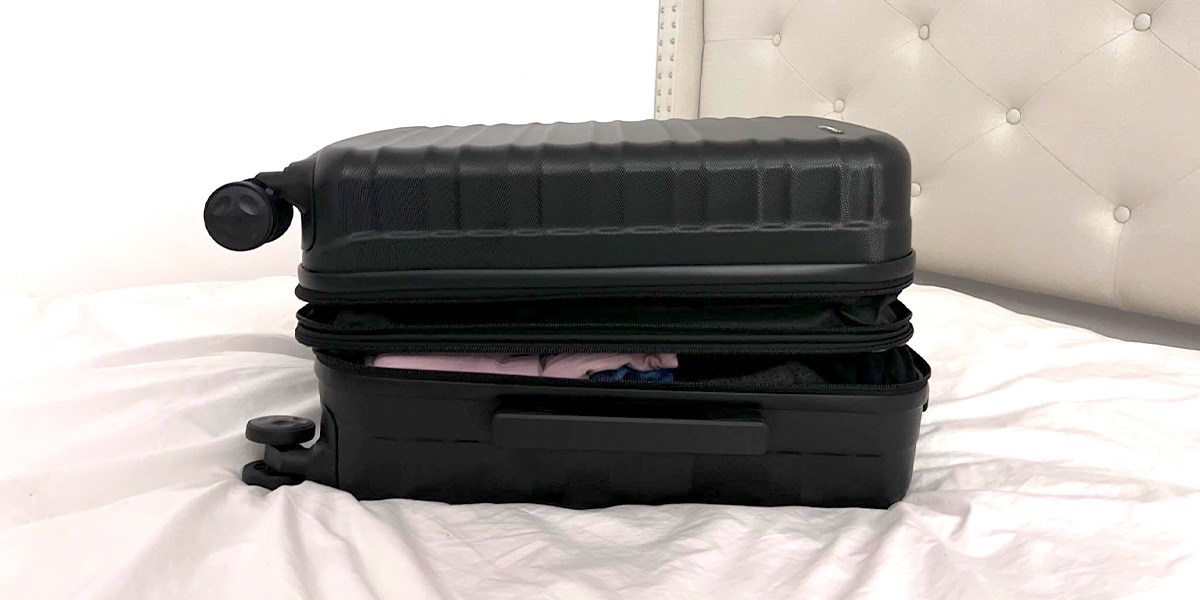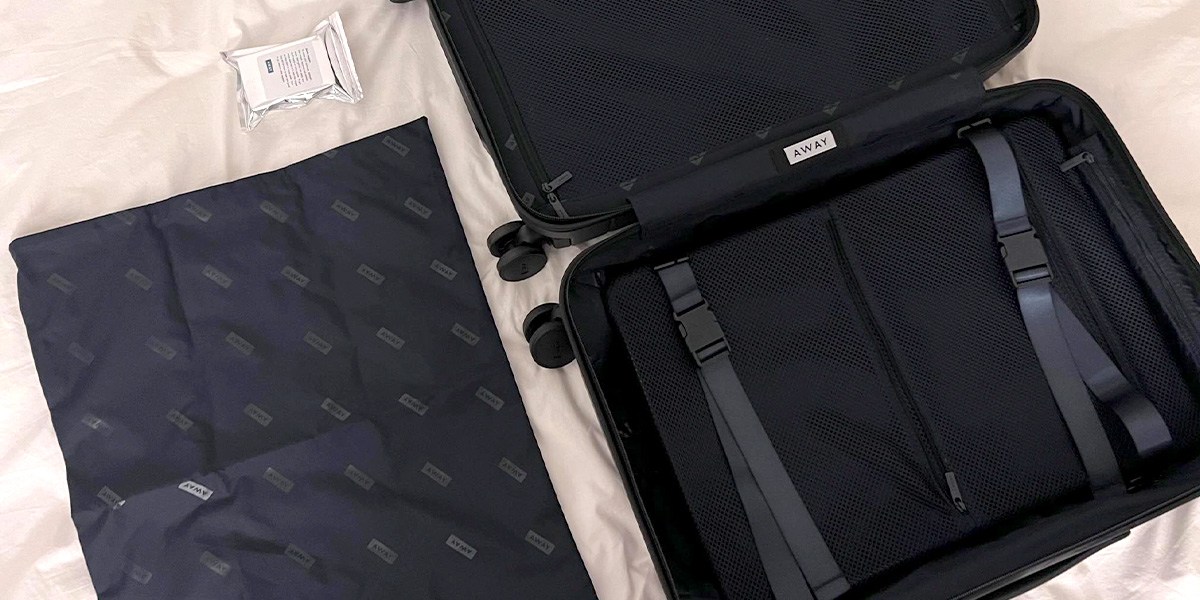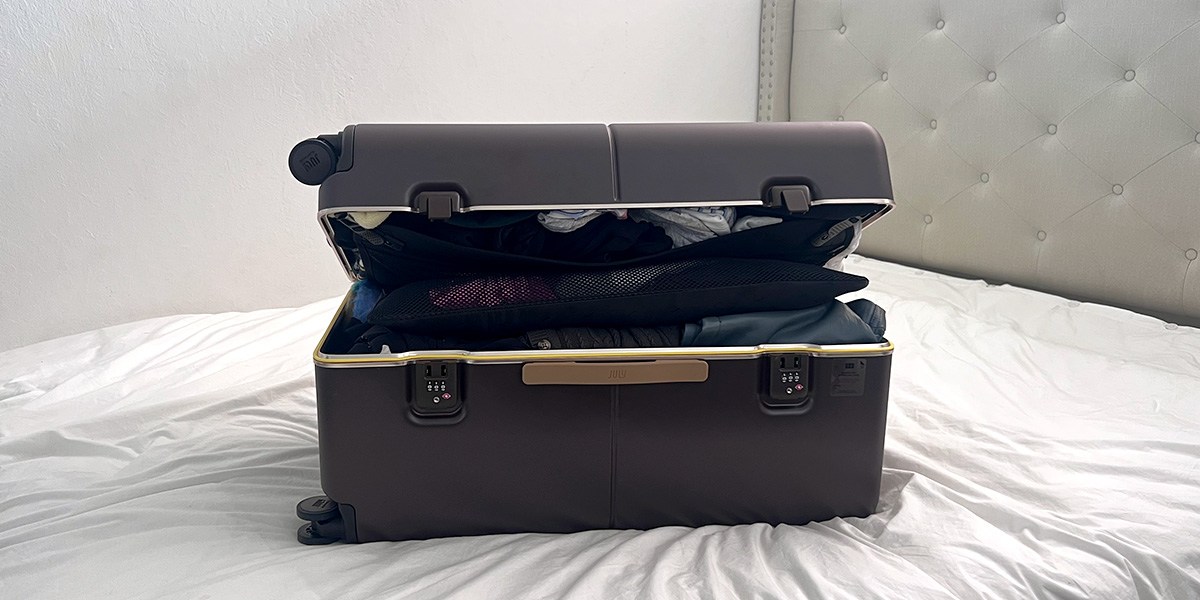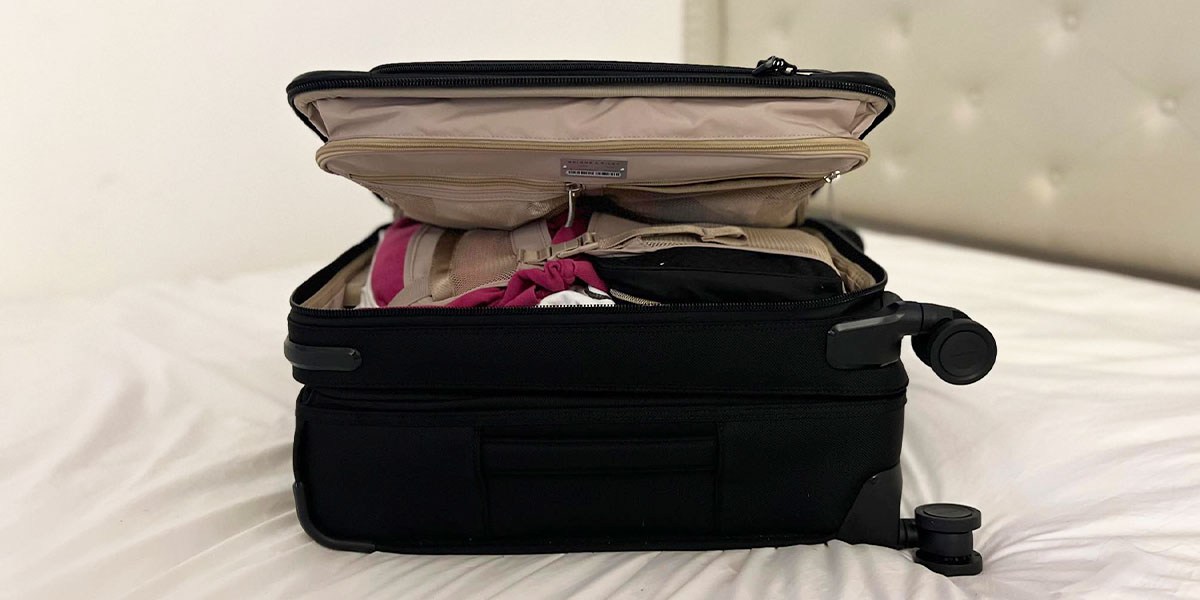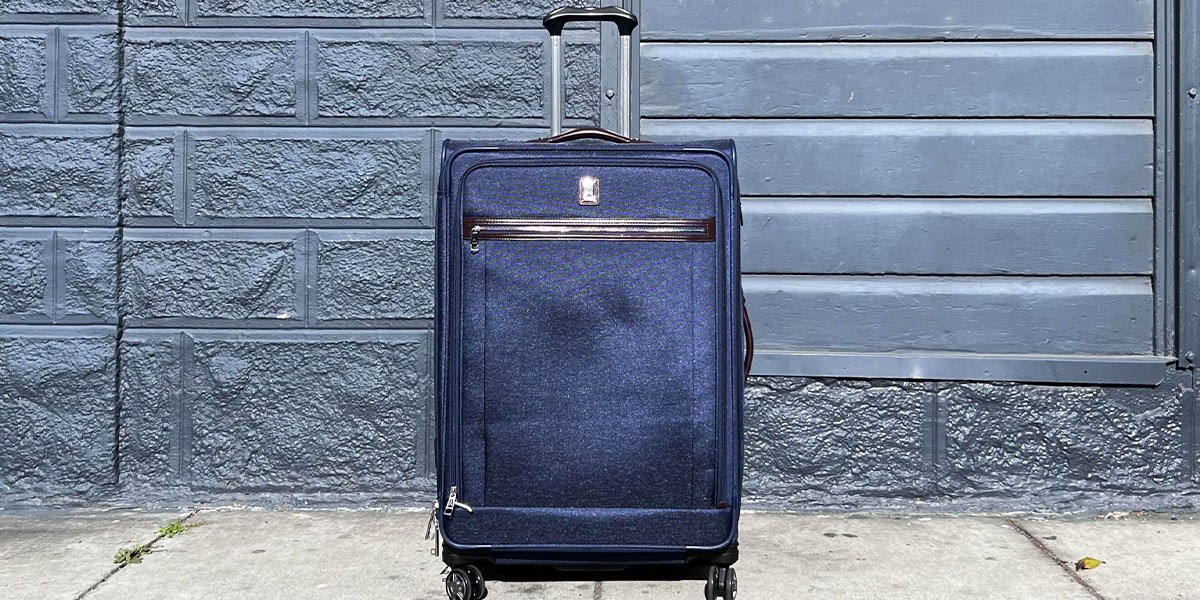The choice comes down to flexibility versus structure, with important features in common
When shopping for luggage, one of the first choices you need to make is between hardside and softside. There are plenty of opinions out there favoring one or the other — but is one kind of luggage truly superior?
Right now, hardside luggage is in. These popular bags boast strong, flexible plastic shells and often come in fashionable, eye-catching colors. Softside luggage, on the other hand, is usually less showy, but their tough fabric construction lets them flex and move, which can be useful when you need to pack a bit extra or squeeze them into tight spaces.
The BestReviews Testing Lab looked at some of the top-rated hardside and softside luggage available, including the Away Carry-On and the Travelpro Platinum Plus Softside Spinner, to evaluate the strengths and weaknesses of each category. Based on our tests, we found that softside luggage beats hardside luggage in more categories, although hardside luggage still has some desirable features that softsides don’t. Which you choose may come down to your personal preferences and travel style.
Hardside vs. softside luggage: What they do well
The testing team found it easier to stuff more into softside suitcases due to their flexible material.
Hardside luggage and softside luggage each have their own specific benefits to consider.
Hardside luggage benefits
- Rigidity: Hardside luggage maintains its shape and protects its contents from impacts and being crushed. Plus, they can’t easily be ripped open by thieves.
- Color: Hardside luggage can be found in brighter, more vivid and more varied colors than softside luggage. It’s also available in a variety of textures and finishes, including gloss and matte.
- Weight: With lightweight shells made of polypropylene, ABS or polycarbonate, the hardside suitcases we’ve tested actually weigh less than their softside counterparts.
Softside luggage benefits
- Flexibility: Softside luggage can flex or squeeze into tough spots, an asset if you need to get your carry-on into an overhead bin.
- Scratch resistance: Durable fabrics such as high-denier polyester or ballistic nylon won’t scratch like hard plastic almost always does.
- Expandability: Most softside luggage offers a single large main compartment for bulkier items and can flex and offer give when fully packed.
What they could improve
Hardside and softside luggage also have their drawbacks.
Hardside luggage drawbacks
- Scratches and scuffs: All hardside luggage will scratch and scuff to some degree, especially if it’s checked and has to undergo baggage handling.
- Less packing flexibility: Hardside suitcases generally open clamshell-style into two equal compartments, which can limit what you bring, especially if you’re traveling with bulky coats or boots.
Softside luggage drawbacks
- Weight: We found that the high-end softside luggage we tested weighed more than their hardside counterparts even when empty.
- May be crushed or torn: While durable and long-wearing, fabric can still be cut or torn with enough force, making them less secure. Softside suitcases that are checked also run the risk of having their contents crushed.
- Stains: The fabric shells of softside luggage may hold onto stains that need more elbow grease to remove than on a hard-shell bag.
Top hardside models
Among the hardside models we tested are the Away Carry-On and the July Checked Trunk. These two models exemplify the best features of hardside luggage. They also boast elegant touches that set them apart from other hardside luggage brands.
Away Carry-On
The Away Carry-On comes in more than 10 different colors and shades and looks terrific while out and about.
Product specifications
Dimensions: 14.4″ W x 9″ D x 21.7″ H | Capacity: 39.8 L | Weight: 7.5 lb | Material: Polycarbonate | Expandable: No
The Away Carry-On is one of the most popular pieces of luggage on the market and might be the reason why hardside spinner carry-ons seem to have taken over every airport terminal in the world. When we tested it, we loved its sleek, minimalist lines, its wide choice of vivid colors, the strength of its polycarbonate shell and, most of all, its amazingly smooth spinner wheels and secure trolley handle. Its compression system was efficient and easy to use, and we appreciated the presence of a third grab handle on the bottom for getting it out of overhead bins.
July Checked Trunk
The July Checked Trunk’s top is flat and durable, making it an ideal place to set down your personal items or a cup of coffee while you wait in line.
Product specifications
Size: 28.25” H x 16.5” W x 14.5” D | Capacity: 95 L | Weight: 13.2 lb | Material: Glazed German polycarbonate shell | Expandable: No
Big and gorgeous, the July Checked Trunk takes the contemporary aesthetics of polycarbonate hardside luggage and marries them to the classic trunk form factor of yesteryear. We loved how much space came with this trunk, and how easy and secure its latches were to use. We packed it full with more than 70 items, including multiple pairs of boots, thanks to its 80/20 design, which provided an extra-deep compartment for our bulkier belongings on one side and a more shallow compartment on the other. Its wheels and trolley handle system were astonishingly smooth and nimble for such a large piece of luggage, and it kept all its contents dry in a 20-minute downpour during our travels.
Top softside models
If softside suitcases make you think of discount luggage that’s only good for one or two trips, you’ve never used a Travelpro or Briggs & Riley. We tested the Briggs & Riley Global 21-Inch Carry-On and the Travelpro Platinum Elite Large Check-In Spinner and found them to be two of the most premium bags we’ve ever used.
Briggs and Riley Global 21-Inch Expandable Carry-On
Unlike many hardside carry-ons, the Briggs & Riley Global Spinner keeps its handle rails outside its compartment, letting you pack flat without wrinkles or bunching.
Product specifications
Size and Capacity: 21” H x 15” W x 9” D | Capacity: 37 to 49 L | Weight: 9.9 lb | Material: Ballistic nylon | Expandable: Yes
Briggs & Riley’s Global 21-inch Carry-On scored highly in our tests, with outstanding grades in build quality, features and design. A hallmark of the Briggs & Riley carry-on is its powerful CX compression system that first expands to accept more items, then compresses them with a push once you’ve zipped the bag closed, returning it to almost its original dimensions. We appreciated the smoothness and maneuverability of its wheels and liked the extras included, such as a garment bag and power pocket for charging your devices with your own battery pack while on the go.
Travelpro Platinum Elite Large Check-In Spinner Softside Suitcase
Product specifications
Size: 29.5” H x 20.5” W x 12.75” D | Capacity: 143.5 L | Weight: 11.5 lb | Material: Nylon | Expandable: Yes
Travelpro is one of the top names in luggage and has been since it was founded by a pilot interested in making the perfect bags for airline crew. The Travelpro Platinum Elite Large Check-In Spinner is one of the brand’s top softside suitcases, with a tough nylon fabric shell that showed zero damage of any sort after our drop testing. We loved its smooth, quiet wheels that locked into place depending on the direction of travel as well as its expansion, included suiter (a garment folder that helps reduce wrinkles) and general premium quality and feel. In fact, we gave it perfect scores in every category we tested.
Away Carry-On vs. Briggs & Riley Global 21-inch Spinner
The Away Carry-On and the Briggs & Riley Global 21-Inch Spinner are both designed to fit the size requirements of cabin luggage. Those requirements limit the total size of any carry-on item, so the Away Carry-On’s hard shell ensures you’ll never be forced to gate-check your bag. However, the compression system used in the Briggs & Riley was one of the most innovative we could find and prevents this softside suitcase from getting too big to slide into an overhead bin. The Briggs & Riley can squeeze in more items and, if you need to check it, won’t show scratches like the Away. The Away, which can’t be expanded, limits you to just the items you know you’ll need.
However, when it’s empty, the Briggs & Riley already weighs almost 10 pounds. Pack it with all it can carry, and you might have some issues lifting it up to the overhead bin. The Away Carry-On is more than 2 pounds lighter than the Briggs & Riley and has a third handle between its wheels for extra convenience. Ultimately, the expandability is the tradeoff between these two stylish and premium carry-ons. The minimalist Away Carry-On is always sure to fit in an airplane bin, but the Briggs & Riley has more features and can hold more stuff.
July Checked Trunk vs. Travelpro Platinum Elite Large Check-in Spinner
When it comes to checked luggage, like the July Checked Trunk and the Travelpro Platinum Elite Large Check-In Spinner, size considerations don’t matter quite as much as weight and durability. Airlines typically have 50-pound limits on checked bags, and we exceeded that when we packed the 11.5-pound Travelpro with two weeks’ worth of items. Despite weighing even more (13.2 pounds when empty), we didn’t quite exceed the 50-pound limit with the July due to its hard shell that didn’t let us pack as much. If you stay within the limit, the expandability of the Travelpro makes it more versatile than the July, while the latches on the July look physically more secure than the zippered seams of the Travelpro.
While you may be free of checked bags once you leave the check-in counter, you’ll need to grab them from baggage claim, roll them to your transportation, and take them to and from your lodgings. Luckily, both the July trunk and the Travelpro softside had fantastic wheels and sturdy trolley arms when we tested them.
Both the July Trunk and the Travelpro Platinum Elite Large Spinner also have excellent organizational features. As with all hardside luggage, the July trunk was more prone to scratches and scuffs from handling than the softside fabric of the Travelpro, but the July stood up to a 20-minute downpour, keeping our belongings nice and dry inside, which we, of course, wouldn’t expect from a softside bag.
Hardside vs. softside functionality
Comparing hardside and softside luggage head-to-head reveals their strengths and weaknesses. Comparisons also reveal what luggage features they have in common, and how they suit your travel needs.
Durability and build quality
While hardsides keep their contents more rigidly protected, their exteriors will undoubtedly get scratched and scuffed, especially if you check them. The July Trunk in particular came out of testing with notable marks and scratches, but it comes with a melamine sponge (like a Magic Eraser) to buff it between uses. The Travelpro and Briggs & Riley suitcases emerged with little noticeable wear and tear, although their flexible construction means their contents are more vulnerable to outside impacts. On the other hand, the July Trunk is reinforced with an aluminum metal frame, making it much more difficult to crush than any softside bag or even the Away Carry-On.
Both the hardsides and softsides cited in this article offered premium materials and construction, and the price tags to show it. Some travelers believe hardside suitcases, especially ones with thick or textured shells, are more durable than glossy or softside luggage — but from what we’ve seen, that isn’t always the case.
Mobility and travel convenience
All four pieces of luggage mentioned here have 360-degree spinner wheels that swivel in any direction, making them all highly maneuverable. You can walk them beside you, push them in front of you or pull them behind you, as you need.
We particularly noted that the Away Carry-On’s wheels were smooth as butter on most terrain, that the July Trunk was surprisingly easy to move despite its long form factor and that the Travelpro’s wheels, which magnetically lock into a specific direction, were distinctly quiet. All four tested suitcases had double-wheeled spinners, which are generally smoother and more durable than single-wheel varieties.
The trolley handle is another important factor in mobility. Flimsy handles with hard, narrow grips are unpleasant to use and might bend or break under stress. The handles of all four pieces in this article proved themselves dependable and durable during our testing, with the Travelpro and July handles being particularly comfortable to touch and hold.
Capacity, organization and compression
Hardside and softside luggage generally differ in how they organize their packing space, and this is true for the Away, Briggs & Riley, July and Travelpro bags we tested. For instance, the July Checked Trunk has an 80/20 arrangement with an extra-deep compartment on one side and a smaller one on the other.
Most hardside suitcases open clamshell-style into two equal halves. One half has a zippered divider and can hold flat or folded clothing, while the other usually has the trolley handle rails along its bottom and works with toiletries or shoes. Softside luggage, on the other hand, usually offers a single main compartment accessed by a lid. The lid itself often includes interior and exterior pockets, but the large main compartment is where you pack all sorts of items as you see fit.
Internal organization and compression help maximize a suitcase’s volume. All the pieces in this article offer internal dividers and zipped pockets, and all but the Travelpro offer specific compression systems to reduce the volume of soft items and increase space, with the Briggs & Riley being a cut above with its mechanical compression system. The Travelpro has plenty of internal organization but also includes expansion, especially in its front lid flap.
Pricing
Softside luggage is usually less expensive than hardside luggage, although among the four pieces we’ve looked at, the premium softside suitcases from Travelpro and Briggs & Riley actually cost more than the ones from July and Away.
The Travelpro Platinum Elite Large Checked Spinner has an MSRP of $529, and the Briggs & Riley Global 21-Inch Spinner is even more expensive at $699. Both are available from Amazon and other retailers. The Away Carry-On retails at $349 and is exclusively available from Away, while the July Checked Trunk costs $545 exclusively from July.
Bottom line: Should you get hardside or softside luggage?
We’ve found that high-end softside luggage like those from Briggs & Riley or Travelpro are some of the best luggage you may ever buy. The Travelpro Platinum Elite Large Checked Spinner in particular scored perfectly across the board.
Hardside luggage, on the other hand, are more protective of their contents, and their hard shells, while more prone to scratching, look sleeker and offer more structure. Light packers and minimalists may prefer the simplicity and rigidity of hardside luggage, while softside luggage rewards people who have a lot to pack. Whichever kind of luggage you choose, you should expect smooth wheels, long-lasting materials and all the space your journeys need.
Prices listed reflect time and date of publication and are subject to change.
Check out our Daily Deals for the best products at the best prices and sign up here to receive the BestReviews weekly newsletter full of shopping inspo and sales.
Copyright 2024 BestReviews, a Nexstar company. All rights reserved.


